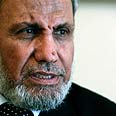
Al-Zahar. Economic independence
Photo: AP
The Israeli public increasingly recognizes that our interest is to disengage from Gaza, rather than control it. Five years after the disengagement,
only the radical margins want to see some kind of link to the hostile territory: The far Right dreams of returning to Gush Katif, while the Left hopes to see Mahmoud Abbas sign a piece of paper that would end the Qassam attacks.
However, the Israeli government finds itself entangled in an imbroglio of contradictory interests: The combination of political interests, economic interests, and pressure that the public remains unaware of. Some of this information is published in the Arab press, however.
For example, Egyptian Foreign Ministry Spokesman Hussam Zaki told newspaper al-Hayat that Israeli Minister Katz’s statements on severing the transportation connection to Gaza are “completely unacceptable and expose Israel’s negative intentions on the matter.”
“The Official Israeli thinking aims to rid itself of the responsibility for the Gaza Strip and impose it on Egypt,” he said. “We fully object to this.” Meanwhile, Egypt’s prime minister noted that the establishment of an independent entity in Gaza “will put an end to the Palestinian people’s legitimate demands of Israel.”
The Egyptian warnings were noted by Hamas’ Mahmoud al-Zahar, who said: “We feared that regularly opening the Rafah Crossing will annul our right for independence from the Israeli occupier. All we want is economic independence from Israel.”
The media in Israel were quick to only quote al-Zahar’s call for Qassam attacks from the West Bank, neglecting that fact that he is making sure to maintain Israel’s status as an “occupying force” in the global perception. Elsewhere, former President Jimmy Carter recently described Gaza as a prison where Israel controls the only two crossing points.
Other spokespeople also do not rush to absolve Israel of responsibility. Responding to the end of the civilian-economic siege and significant boost in the scope of goods to enter the Strip, UNRWA Spokesman Christ Gunness said that Israel directs aid trucks to the Kerem Shalom Crossing deliberately, where unloading the goods takes longer. He demanded that Israel open the Karni Crossing.
Useless red lines
When official UN spokespeople in New York were asked about the great sums of cash (in dollar notes) poured by UNRWA into the Strip ($12.5 million monthly,) they refused to address the issue. One spokesman said complaints about the money being transferred into Gaza and its constant dependence on foreign aid must end. Instead, he said, the only complaints should focus on Israel’s blockade and its failure to allow exportation from Gaza via Israeli ports.
These statements signaled more directions where Israel can expect to face pressure: Opening more crossings (in both directions,) and later, in the wake of apparent reconciliation between Abbas and Hamas, reopening the “safe passage” between Gaza and the West Bank.
So where is the Israeli government in the midst of this mess? It keeps on drawing red lines, yet still fails to understand how these red lines keep being crossed despite all the gestures it makes. All that is left for the government is to insist on symbols and spins (“No to an Iranian port,” “military siege on Gaza,” “the blockade will only be lifted once Gilad Shalit is back,” “economic peace.”)
Israeli spokespeople make no mention of a well-known fact in the Arab world: Gaza is the world’s largest prison, but not because of Israel – but rather, because of the Egyptian government’s refusal to allow free exit via the Rafah Crossing. The crossing indeed opens for the sick and for students, yet the Egyptians continue to impose limits on the general Gaza population for fear that the border will be breached again.
White House Chief of Staff Rahm Emanuel was quoted as saying that a crisis must not be wasted without drawing some benefit from it. Well, last week the Israeli government had an opportunity to take advantage of the flotilla crisis and tell the whole world: “You want goods to come into Gaza and you want Gazans to freely leave the Strip? No problem, we’re sealing off the Erez Crossing hermetically; let Egypt open the Rafah Crossing to any person and any goods – with the exception of military equipment.”
However, such logical declaration is impossible in a government where hidden interests abound, and for their sake Israel shall continue to be “the occupier that imposes a blockade all around Gaza.” Anyone who thinks that Sunday’s decision to ease the “siege” will end the pressure on Israel or curb the military threat from Gaza should stand up. Anyone?
Avi Trengo is a journalist















